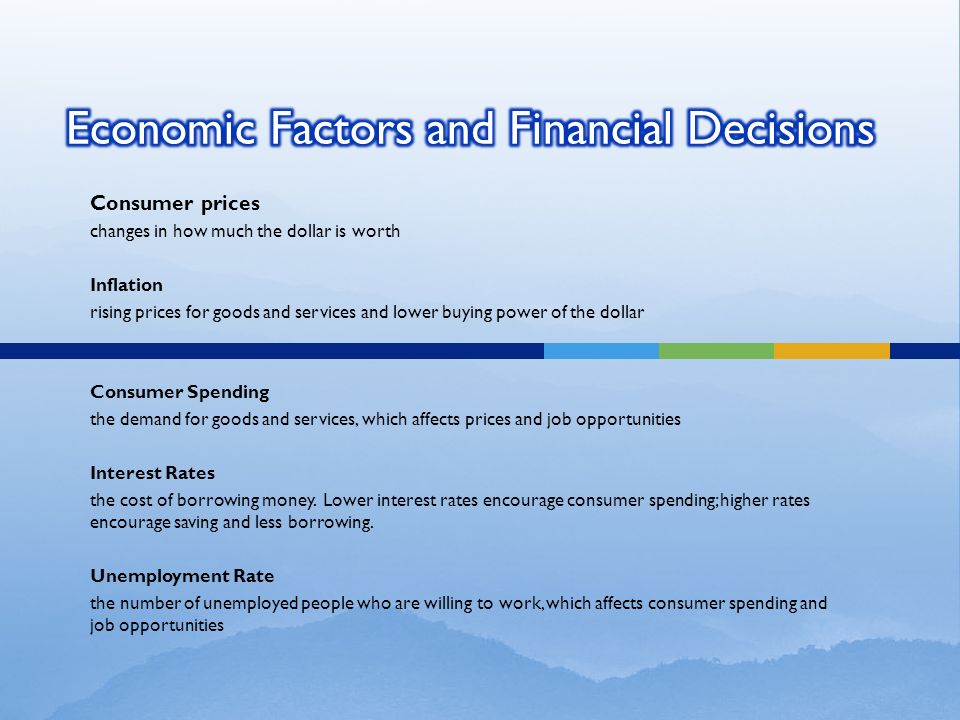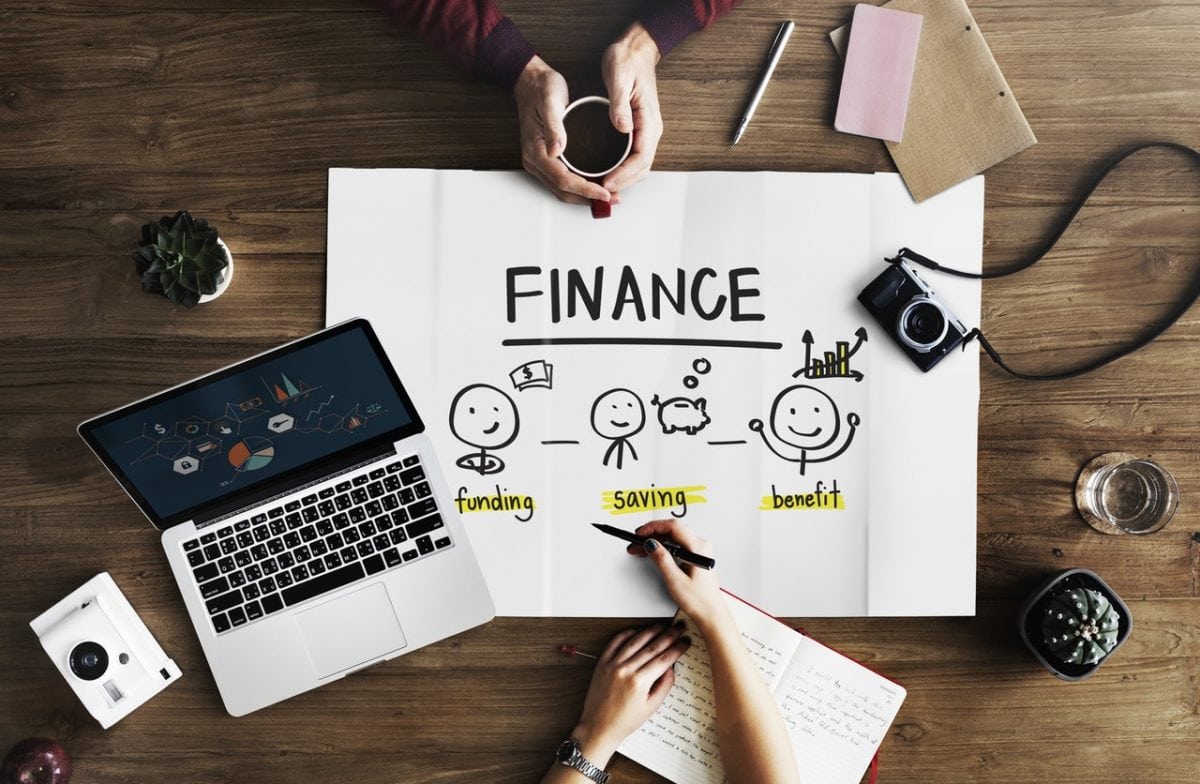Economic Impact On Personal Finance - Thriving Amidst Fluctuations
Navigate economic impact on personal finance. Learn strategies to adapt, invest, and thrive in changing landscapes.
Author:James PierceReviewer:Camilo WoodJan 25, 202486 Shares10.7K Views

The relationship between the broader economic landscape and personal finance is dynamic and intricate. Economic fluctuations, policy changes, and global events can significantly influence individual financial well-being. Understanding the economic impact on personal financeis crucial for individuals to make informed decisions, adapt to changes, and seize opportunities.
Everyday economic actions have a significant impact on financial planning as well. The dynamics of supply and demand are major factors in determining prices in our society. The creation and distribution of wealth are the subject of economics.
To meet our needs and desires, the government, business, and labor unions are the main institutions that make up the economic environment. These organizations must cooperate with one another.
The profound impact of national and global economic shifts, influencing work opportunities, product/service costs, and subsequently individual budgets, underscores the significant role these changes play in shaping personal finances.
For instance, finding work may be more difficult and prices may rise during a recession or economic downturn due to a shortage of goods and services relative to demand. Moreover, the cost of borrowing money, including when applying for a loan or a mortgage, can be significantly impacted by inflation and changes in interest rates.
The days when people could afford to ignore the bigger currents affecting their future and financial security are long gone. In order to comprehend how the domestic and international economies may affect your personal finances, it is now essential to develop a greater interest in the workings of economic policy and to keep up with current events in these areas.
In some respects, the U.S. economy in 2023 was riddled with paradoxes and ambiguities. Data points and narratives, in particular, almost never follow a straight line. They occasionally make abrupt changes. Our lives now include volatility as a feature rather than a flaw.
Technically speaking, or practically speaking, a recession has been averted. Even with this resilience, according to a Bankrate survey, 59% of Americans thought that they were living in a recession.
This makes sense because, according to the rise in the Consumer Price Index, inflation over the last few years has eroded around one-fifth of their purchasing power. Compared to previous years, inflation is declining. However, the burden of exorbitant costs has not been lifted off of customers.
Gas prices hit their lowest point in nearly two years as the year came to an end. Bond market rates have dipped while stock prices have risen to all-time highs. The Federal Reserve has hintedthat it may start to reverse direction in 2024 and will probably be lowering rates, contingent on how inflation and the overall economy develop in the future.
Here's an exploration of key aspects of the economic impact on personal finance:
Employment And Income
Economic conditions play a pivotal role in shaping the employment landscape and directly impact individuals' income levels. During periods of economic growth, job opportunities tend to increase, leading to higher employment rates and, subsequently, higher income levels for many individuals. Conversely, economic downturns can result in job losses and decreased income.
Economic growth is often associated with increased business activities, leading to job creation across various sectors. As businesses expand, they hire more employees to meet growing demands. This results in a positive correlation between economic growth and employment.
Understanding the dynamics of the job market is crucial for individuals. During economic upswings, job seekers may find more opportunities, and employers may be willing to offer competitive salaries. Conversely, during economic downturns, job markets can be competitive, and job seekers may face challenges in securing employment.
Economic conditions not only influence the availability of jobs but also impact income levels. Higher demand for skilled workers during economic growth can lead to salary increases and improved income prospects. Conversely, economic contractions may result in wage stagnation or even reductions.
Inflation And Purchasing Power
Inflation is a key economic indicator that measures the rate at which the general price level of goods and services rises. This phenomenon directly affects the purchasing power of money, influencing how individuals budget and spend their income.
Inflation erodes the real value of money over time. As the cost of goods and services increases, each unit of currency buys less. Understanding inflation is essential for individuals to plan their budgets effectively and make informed financial decisions.
The impact of inflation is most evident in the cost of living. As prices rise, everyday expenses such as groceries, housing, and healthcare become more expensive. Individuals need to factor inflation into their budgeting to ensure that their income can cover their essential needs.
Interest Rates And Borrowing Costs
Interest rates, influenced by economic factors and central bank policies, have a direct impact on borrowing costs. Individuals navigating personal finance must understand how changes in interest rates can affect their ability to borrow and the overall cost of debt.
Central banks use interest rates as a tool to manage economic conditions. Lowering interest rates can stimulate borrowing and spending during economic downturns, while raising rates can cool an overheating economy. These actions have cascading effects on individual borrowing costs.
Changes in interest rates directly impact the affordability of loans. Low-interest rates make borrowing more accessible and affordable, encouraging activities such as home purchases or business expansion. Higher interest rates, on the other hand, can increase the cost of debt.
Individuals should consider their borrowing decisions strategically, taking into account prevailing interest rates. This includes evaluating the terms of loans, refinancing opportunities, and being mindful of potential changes in interest rate environments when planning major financial decisions.
Investment Returns And Market Volatility
Investing is a fundamental component of personal finance, and the economic environment significantly influences investment returns and market volatility. Understanding how economic factors impact investment portfolios is crucial for individuals seeking to optimize their financial well-being.
Economic conditions play a pivotal role in shaping market performance. During periods of economic growth, stock markets often experience positive trends, contributing to favorable investment returns. Conversely, economic downturns can lead to increased market volatility and potential declines in investment values.
Market volatility underscores the importance of diversification in investment portfolios. Diversifying across different asset classes, such as stocks, bonds, and real estate, can help mitigate risks associated with fluctuations in specific markets. A well-diversified portfolio is better positioned to weather market uncertainties.
Housing Market Dynamics
The housing market is a cornerstone of personal finance, with economic factors influencing both homebuyers and homeowners. Economic conditions impact housing affordability, mortgage rates, and the overall dynamics of the real estate market.
Economic growth often correlates with increased demand for housing. As employment opportunities expand and incomes rise, more individuals seek homeownership. This heightened demand can lead to increased property values and a competitive housing market.
The level of interest rates directly affects the affordability of homes. Low-interest rates make mortgages more accessible and affordable, stimulating home purchases. Conversely, rising interest rates may limit affordability, impacting the housing choices available to potential buyers.
Real estate is not only a place to live but also a potential investment. Economic conditions influence the return on investment for real estate properties. During economic upswings, property values may appreciate, presenting opportunities for homeowners and real estate investors.
Economic conditions influence the balance between housing supply and demand. In high-demand markets, limited housing supply can drive up prices, presenting challenges for buyers. Understanding the local market dynamics is crucial for individuals considering buying or selling property.
Tax Policies And Planning
Changes in tax policies have a direct impact on personal finance, influencing disposable income, deductions, and credits. Understanding and proactively planning for tax implications are essential components of effective financial management.
Changes in tax rates directly affect the amount of disposable income individuals have. Higher tax rates may reduce take-home pay, while lower tax rates can result in increased disposable income. Staying informed about tax rate changes is crucial for budgeting and financial planning.
Tax deductions and credits can significantly impact the overall tax liability. Individuals should be aware of available deductions, such as those related to homeownership, education expenses, and retirement contributions. Maximizing deductions and credits can contribute to tax savings.
Understanding the timing of financial transactions can have tax implications. For example, strategically timing the sale of investments or the purchase of a home can impact capital gains taxes. Planning financial activities with an awareness of tax consequences is integral to optimizing outcomes.
Tax-advantaged accounts, such as 401(k)s, IRAs, and Health Savings Accounts (HSAs), offer individuals opportunities to save and invest with tax benefits. Contributing to these accounts can result in tax deductions, tax-deferred growth, or tax-free withdrawals, depending on the account type.
Economic Policy And Legislation
Economic policies and legislative changes are powerful drivers that can significantly impact personal finance. Government decisions, fiscal policies, and regulatory reforms can influence various aspects of the economy, creating both challenges and opportunities for individuals.
During times of economic downturn, governments often implement stimulus packages to boost economic activity. These packages may include measures such as tax cuts, direct payments to individuals, and increased government spending. The goal is to stimulate consumer spending, investment, and overall economic growth.
Central banks use monetary policy, including adjustments to interest rates, to manage economic conditions. Lowering interest rates can encourage borrowing and spending, while raising rates can cool an overheated economy. These changes impact borrowing costs, investment decisions, and overall financial planning.
Government spending on infrastructure projects can have a significant impact on economic growth. Infrastructure investments create jobs, stimulate demand for goods and services, and contribute to overall economic development. Individuals may benefit indirectly through increased job opportunities and economic prosperity.
Changes in the tax code can directly affect individuals' financial situations. Tax reforms may alter income tax rates, deductions, and credits, influencing disposable income and overall tax liabilities. Staying informed about tax code changes is crucial for effective financial planning.
Economic policies often aim to achieve price stability and manage inflation. Inflation, if left unchecked, can erode the purchasing power of money. Policies that maintain price stability contribute to a more predictable economic environment for individuals to plan their budgets and make informed financial decisions.
Economic policies have a profound impact on financial markets and investments. Government decisions can influence stock market performance, interest rates, and the overall investment climate. Understanding these dynamics is crucial for individuals managing investment portfolios.
Emergency Preparedness
Financial emergencies, whether personal or widespread, can have a profound impact on individuals' financial stability. Establishing emergency preparedness measures is crucial for navigating unforeseen challenges and maintaining financial resilience.
One of the foundational steps in emergency preparedness is building an emergency fund. This fund serves as a financial safety net, providing individuals with the means to cover essential expenses in case of job loss, medical emergencies, or unexpected financial setbacks.
The size of an emergency fund depends on individual circumstances, such as monthly expenses, income stability, and risk tolerance. Financial experts often recommend saving three to six months' worth of living expenses in an emergency fund.
Financial emergencies may require individuals to adjust their budgets temporarily. Maintaining flexibility in budgeting allows individuals to reallocate funds to cover immediate needs during challenging times without compromising their overall financial stability.
Adequate insurance coverage is a critical component of emergency preparedness. Health insurance, life insurance, and property insurance can provide financial protection in the event of unexpected medical expenses, loss of a loved one, or damage to property.
Anticipating the possibility of job loss and preparing for it can mitigate the financial impact. This includes updating resumes, networking, acquiring new skills, and exploring alternative income streams or freelance opportunities.
Emergency preparedness involves minimizing exposure to high-risk debt. Individuals should be cautious about accumulating high-interest debt, as it can exacerbate financial challenges during emergencies. Prioritizing debt repayment and avoiding unnecessary credit can contribute to financial resilience.
Education And Skill Development
In a rapidly evolving economy, continuous education and skill development are critical for individuals to stay competitive in the job market and adapt to changing economic conditions.
Lifelong learning involves the ongoing acquisition of knowledge and skills throughout one's career. Embracing a mindset of continuous learning allows individuals to stay abreast of industry trends, technological advancements, and changes in job requirements.
Identifying and acquiring in-demand skills enhances employability. Individuals should assess the skills relevant to their industry and profession, seeking opportunities for training, certifications, or further education to remain competitive in the job market.
Online learning platforms have democratized access to education and skill development. Platforms offering courses, webinars, and certifications allow individuals to upskill or reskill from the comfort of their homes, making education more accessible and flexible.
Professional development goes beyond formal education and includes activities such as attending conferences, workshops, and networking events. Engaging in professional development opportunities fosters continuous growth and expands professional networks.
Staying informed about industry trends and future projections is essential for making informed decisions about skill development. Researching the evolution of industries provides insights into the skills that will be in demand in the future.
Technology is a driving force behind economic shifts. Individuals must adapt to technological changes by acquiring digital literacy and embracing emerging technologies relevant to their fields. This adaptability enhances employability and opens new opportunities.
In addition to technical skills, cultivating an entrepreneurial mindset and creativity is valuable. Entrepreneurs and innovative thinkers are often sought after in dynamic economic environments. Embracing creativity fosters problem-solving skills and adaptability.
FAQs
How Does Economic Growth Impact Personal Finance?
Economic growth can positively influence personal finance by creating job opportunities, increasing income levels, and boosting investment returns.
What Are The Effects Of Inflation On Personal Finance?
Inflation erodes the purchasing power of money, affecting the cost of living. Individuals need to consider inflation when budgeting and investing to maintain their financial well-being.
How Do Changes In Interest Rates Affect Personal Finance?
Changes in interest rates impact borrowing costs and investment returns. Low-interest rates may offer affordable borrowing, while rising rates can increase the cost of debt.
What Is The Impact Of Tax Policies On Personal Finance?
Changes in tax policies can significantly influence disposable income, deductions, and credits. Staying informed and adapting financial strategies is crucial for optimizing outcomes.
How Can Individuals Adapt To Changing Skill Requirements In The Job Market?
Lifelong learning and skill development are crucial for staying relevant in the job market. Adapting to changing skill requirements enhances employability and income potential.
What Are The Fundamentals Of Long-term Financial Planning?
Long-term financial planning involves setting clear goals, creating a budget, saving for retirement, and strategically managing investments. A well-defined plan provides a roadmap for financial success.
Conclusion
The economic impact on personal finance underscores the interconnected nature of individual financial well-being and broader economic trends. Navigating the challenges and opportunities arising from economic shifts requires a proactive and informed approach.
Monitoring economic indicators, staying abreast of policy changes, and adapting financial strategies are essential components of managing personal finances in a dynamic economic environment. By understanding the complex interplay between the economy and personal finance, individuals can make informed decisions, build resilience, and pursue financial goals even in the face of economic uncertainties.

James Pierce
Author

Camilo Wood
Reviewer
Latest Articles
Popular Articles

